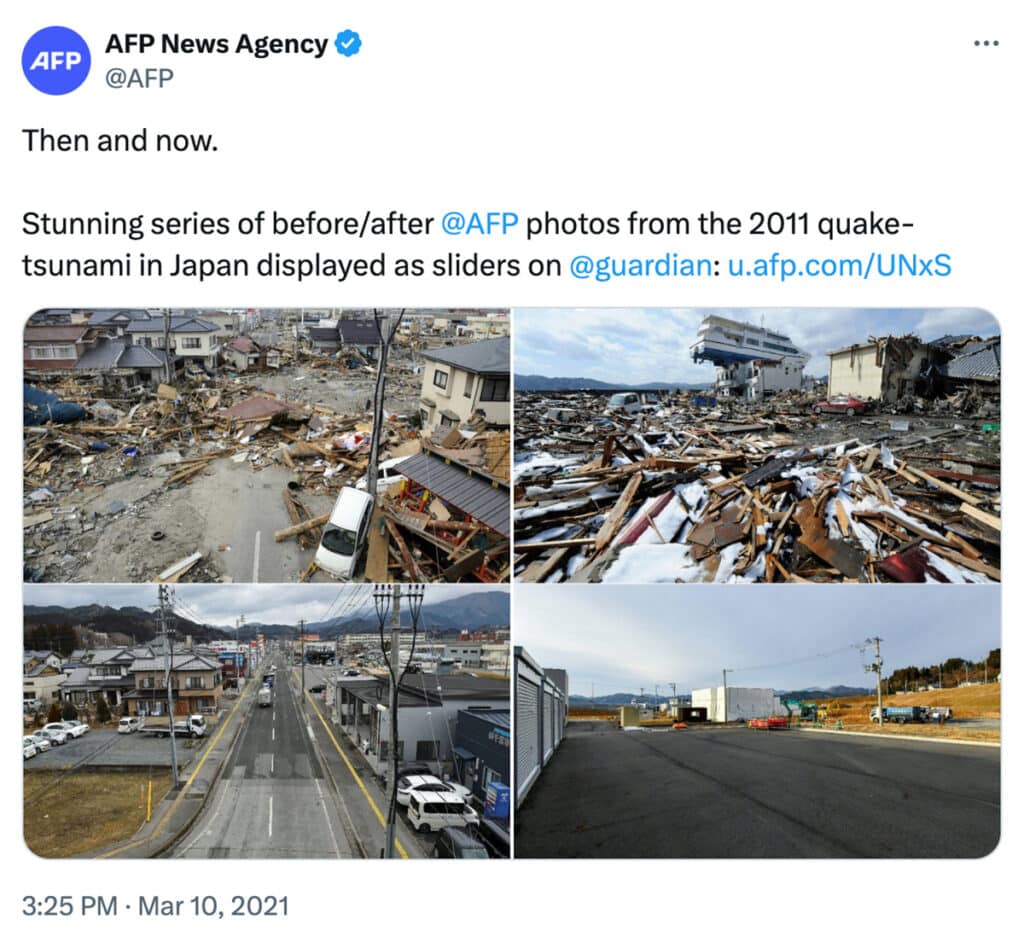Volcanoes are erupting in The Philippines, but on-fire Australia received some welcome rain. The Iran war cries have been called off and The Donald’s military powers are about to be hamstrung by the Senate. Meanwhile, his impeachment trial is starting, and we’re all on Twitter for a front-row seat.
What Could Go Right? Six Forgotten Stories of Resilience
Major events that once dominated our attention but have since receded into history
This is our weekly newsletter, What Could Go Right? Sign up here to receive it in your inbox every Thursday at 5am ET. You can read past issues here.
Six Forgotten Stories of Resilience
The power of the media to direct our attention is exceptional. And what does it direct our attention to most? The worst of what’s going wrong in the world. There is plenty the media could correct on that front. But it’s also just the nature of the news, and of life. It takes much longer to build than to destroy, and the news moves at the pace of immediate crisis, not years-long repair.
Still, it’s a beneficial exercise to remember that despite all of our problems, we also have incredible capacity to address them. When incredible capacity is matched with incredible effort, often our worst fears are never realized.
To that end, and per a reader’s request, I thought it would be interesting this week to look back on some events that were serious crises at the moment they happened but have since faded into the rearview mirror as they moved out of news headlines.
Mid-1990s: The Mad Cow Outbreak
Hundreds of people died, millions of cattle were slaughtered, and billions of dollars were lost in Britain during the height of the mad cow outbreak in the mid-1990s. The cause of the disease was traced back to cows eating bits of cow carcasses in their feed (gross), a practice that has since been regulated. These days, cases of mad cow do occasionally appear, but they are rare.
2000: The Y2K Bug
Who could forget the worry over technological breakdown and international mayhem in the time leading up to January 1, 2000? “I feel like our days could be numbered,” one woman says in HBO’s documentary on the matter, Time Bomb Y2K. Billions were spent to get computerized systems ready for the 1999 to 2000 changeover, to great success: they ended up making the transition mostly without incident.
2006: The Bee Killer
After colony collapse disorder began striking down millions of bees in 2006, journalists began to contemplate a world without bees. Their disappearance would have been, in short, an agricultural disaster. Fast forward to today, and the United States actually has a record number of honeybees, thanks to efforts in the agricultural sector as well as lots of money. Colony collapse disorder disappeared around 2011, although we don’t know why. While concern over losing species of wild bees is valid, we now know that honeybees are more like farm animals whose populations are managed by big industry.
2009: The Start of Grexit
I’ve written about this one before. Now that Greece is finally climbing out of the financial hole it had dug itself into by 2009, it’s easy to forget the widespread panic both inside and outside the country for several years, as Molotov cocktails were thrown in Athens’ central square and pundits puzzled over just how bad a potential exit from the eurozone would be. This year, for the first time in over a decade, Greece’s economy has the potential to thrive.
2011: The Tohoku Disaster
In 2011, Japan was hit by a 9.1 magnitude earthquake, the fourth largest earthquake recorded since 1900. The quake and the tsunami it triggered left over 18,000 dead and sowed chaos at three nuclear reactors. Since then, the country has been repairing the damage and preparing for next time, building sea walls higher than ever before, earthquake-proofing infrastructure, and educating the public even more thoroughly about disaster response.

After an earthquake in January of this year, a professor at the University of Tokyo, who specializes in disasters, toldThe Associated Press that “There are probably no people on Earth who are as disaster-ready as the Japanese.” Even in 2011, experts believed that Japanese building codes, designed with earthquakes in mind, as well as good emergency response systems mitigated the earthquake’s toll.
2019: The Covid-19 Pandemic
This one might be too soon to talk about, but sometimes, it does feel like forever ago that Covid-19 was the dominant factor in the lives of the entire globe. Millions of people died from Covid, and the disease, of course, will always remain with us. But we are a world away from the lockdowns, quarantines, and social distancing of just a few years ago, and are armed with the many technological innovations and cultural changes of the era, including at-home testing and mRNA vaccines (speaking of, the world’s first trial of an mRNA vaccine for lung cancer just started—more on that in the links section). We have passed through the post-Covid supply chain disruptions as well, and most economies have rebounded.
This isn’t to downplay the severe damage many of these events wrought, or to say that things always get better after a crisis fades from the news. There are many counterexamples to the ones above: the aftereffects of BP’s Deepwater Horizon oil spill is a specific one that came up during my research, not to mention the situations in Afghanistan, Sudan, or Israel/Palestine, none of which have settled.
But on the whole, we probably don’t stop to appreciate renewal—hard-won, beautiful, necessary renewal—as much as we could. Big problems are always on the horizon. Less visible are the crowds of people working diligently to avert them.
What Could Go Right? S6 E19

How has the Democrats’ shift to Kamala Harris upended the election cycle? Zachary and Emma speak with Pulitzer Prize-winning journalist and author Evan Osnos to discuss the current state of the Biden presidency and the rise of Kamala Harris. They look at the factors that led to Biden’s decision to drop out of the presidential race and the impact of his decision on the Democratic Party. They discuss the role of social media and the potential impact of this energy on the election for both candidates. The conversation also touches on the reasons why voters in places like West Virginia have turned away from the Democratic Party and the impact of right-wing propaganda. | Listen now
By the Numbers
11%: The share of US adults who say they have smoked cigarettes in the past week, a historic low. In the 1980s, it was still more than a third. The trend is being driven by adults under 30.
1.6M: The number of lives saved in Europe by Covid-19 vaccinations, according to new estimates. Most of them were people aged 60 and older.
1.1M: The number of lives saved in the US over the past three decades because of routine immunizations. The Centers for Disease Control and Prevention also estimates that they have saved the US $540 billion in health care costs. (NYT $)
5: The number of US states that have outlawed corporal punishment in all schools. Illinois was the latest to pass legislation, which is set to take effect in January.
Quick Hits
🫁 Trials for the world’s first mRNA lung cancer vaccine have started. About 130 patients in 7 countries will receive jabs that are meant to kill cancer cells and prevent their return. And next year, a trial will begin to test whether mRNA can repair terminally ill organs—specifically, livers. (Wired $)
💉 A new study has found that Merck’s Ebola vaccine had an effectiveness of 84 percent—meaning that 84 percent fewer people, if vaccinated, would develop the disease as compared to what would happen in a group of unvaccinated people—in the 2018–2020 outbreak in the Democratic Republic of the Congo. There are two Ebola vaccines, but Merck’s is the main one used during outbreaks since it requires only one dose. A previous study found that it boosted survival rates in those infected with Ebola.
🩸 The Food and Drug Administration has approved a gel, called Traumagel, that can stop moderate to severe bleeding from wounds in seconds. It has the “color and texture of hummus,” and needless to say, the Department of Defense is interested. It could also be useful in cases of gunshot wounds.
🇬🇳 Guinea, a country in West Africa, has eliminated maternal and neonatal tetanus—a lethal disease typically contracted during unhygienic childbirth practices. It remains in only ten countries.
🧑⚖️ A US federal judge has ruled that the military cannot turn away HIV-positive enlistees, remarking that “modern science has transformed the treatment of HIV.” Many who have it are now asymptomatic and have undetectable viral loads.
🐄 Scientists are attempting to gene-edit cows so that their burps no longer emit methane, which contributes to global warming. (The methane burping is not necessary to the cows’ health.)
🧊 A study has found that the “Doomsday Glacier” is unlikely to rapidly collapse due to marine ice cliff instability—a concept scientists proposed in the past decade—and will remain fairly stable until about 2100. Still, not all is well. Warm ocean currents are thinning the ice from below.
📉 School violence in the US has declined precipitously over the past decade, including bullying, theft, teacher and student assaults, and gangs. There is one notable exception: gun violence.
👀 What we’re watching: The November election will be a doozy in more ways than one: ten states have ballot measures to establish a right to an abortion in their state constitutions. (NYT $)
💡 Editor’s pick: Why are young adults, particularly on the left, isolated and pessimistic about social change? A policy correspondent for Vox explores why she changed her mind about volunteering.
TPN Member Originals
(Who are our Members? Get to know them.)
- The Democratic Party platform | Tangle | Isaac Saul
- 28 thoughts on the Democratic National Convention | Tangle | Isaac Saul
- Riding the vibes to victory | Slow Boring | Matthew Yglesias
- The ultimate happiness diet | The Atlantic ($) | Arthur C. Brooks
- The warehouse worker who became a philosopher | The Atlantic ($) | Thomas Chatterton Williams
- Ode to man: Chapter 3 of The Techno-Humanist Manifesto | The Roots of Progress | Jason Crawford
- Humor: An effective anti-authoritarian tool | Lucid | Ruth Ben-Ghiat
- The micromanaged economy | The Edgy Optimist | Zachary Karabell
- The hidden grammatical reason that ‘weird’ works | NYT ($) | John McWhorter
- Has Biden’s chip-war chief met her match? | Nonzero | Robert Wright
- A thermodynamic miracle: Compute and energy are key to humanity’s continued evolution | Faster, Please! | James Pethokoukis


